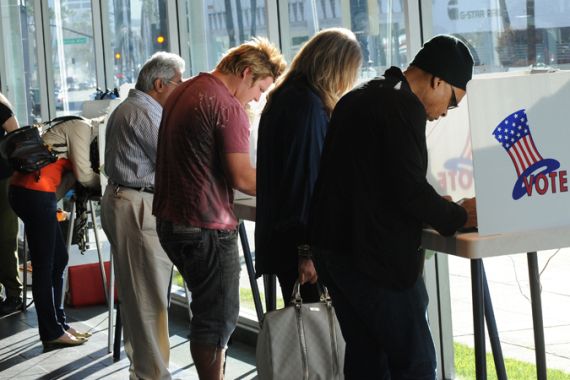Polls begin to close in US midterm
Rand Paul of Kentucky becomes US senate’s first Tea Party member, as Republicans gain Indiana seat as well

 |
| Michelle Obama (R), the wife of president Barack Obama, made a last-minute speech for Democratic Senate leader Harry Reid (L), who is running in one of the country’s closest races. [EPA] |
American voters are poised to deliver a heavy blow to President Barack Obama’s Democrats, according to polls, in an election that promises to shake up the political landscape across the United States.
Polls opened before dawn on Tuesday in some areas of the eastern United States and started to close at 6pm EDT (2200 GMT), but it will be hours before results are known in many crucial races.
All 435 House seats, as well as 37 Senate seats and 37 state governorships are at stake in Tuesday’s voting, and many states have been conducting early and mail-in voting for weeks.
Dozens of races were considered too close to predict after candidates in both parties launched a frenetic round of last-minute campaign stops and fundraising appeals on Monday.
| IN DEPTH | ||
|
Just two years after Obama swept into office with large congressional majorities on a promise of hope and change, voters discouraged by the dismal US economy are expected to hand Republicans control of the House of Representatives.
Republicans are also expected to make gains in the Senate, with a long shot at capturing the upper chamber. Republicans buoyantly forecast a new era of divided government.
“We’re hoping now for a fresh start with the American people,” Michael Steele, the Republican National Committee chairman, said.
Heading into the vote, Al Jazeera’s John Terrett reported from Washington DC, the well-followed Gallup polling agency said Republicans were riding a historic wave of popularity, with a lead over Democrats in opinion polls of up to 15 per cent.
Though Obama has emphasised the passage of health care and Wall Street reform legislation, “out on the stump, people are concerned about … the economy,” Terrett said. “They do worry about where their jobs are coming from”.
Tea Party factor
The elections at the midpoint of Obama’s term are a prime-time test of strength for the loosely knit conservative-libertarian Tea Party movement, a force unheard of just two years ago that advocates limited government and low taxes.
Tea party supporters rattled the Republican establishment in the primaries, tossing out several veteran lawmakers and running more than 70 candidates, nearly three dozen of whom are in competitive races in Tuesday’s poll.
But Democrats hope that the ultraconservative policies of many Tea Party-backed candidates might prove too extreme for voters in the general election.
The tea party has energised Republican voters upset with Obama’s far-reaching health care reform law and the staggering sums poured into stimulating the economy with little movement downward in an unemployment rate stuck just below 10 per cent.
With polls showing Republicans more enthusiastic about voting, Democrats are trying to limit their losses with a strong get-out-the-vote drive by party activists, Obama’s organisers and labour unions that proved itself in 2008.
Obama was back at the White House after a weekend campaign swing through four states, in a bid to rekindle the enthusiasm of young voters, liberals, blacks and independents whose ballots propelled him to the presidency.
Bill Clinton, the former president, rallied support for Democrats and campaigned late into the night with stops in New York, Pennsylvania, West Virginia, Kentucky and Florida.
Obama’s test
Michelle Obama, the president’s wife, made stops in Nevada and Pennsylvania to help Democratic senatorial and gubernatorial candidates.
“We have come too far,” Michelle Obama told a night-time rally at the University of Pennsylvania. Sitting out the election, she warned, could stop progress for people struggling to stay in the middle class, afford college or obtain health care.
America’s political environment has changed drastically since 2008, when Democrats made gains across the country, riding a wave fuelled by voters’ economic anxiety, their weariness with George Bush’s presidency, and Obama’s popularity.
Some wondered if Republicans would need decades to recover.
But the anti-incumbent mood and economic worries didn’t go away and, with Democrats now controlling the White House as well as Congress, public anger is directed at them.
“This election is entirely about him (Obama) and this big majority in Congress and what they’ve been doing for the last two years,” Mitch McConnell, Senate Republican Leader of Kentucky, said.
Democrats say they inherited an economy in dire condition and managed to prevent a financial breakdown and the collapse of the US auto industry. But they find it hard winning elections by arguing that things could have been worse.
The vote will likely reshape American politics as Obama looks toward running for re-election in 2012 and Republicans begin the process of selecting a candidate to oppose him.
A big Republican win would derail Obama’s agenda in the last two years of his first term, potentially leaving Washington in political gridlock unless the president can find common ground with some of his fiercest critics.
